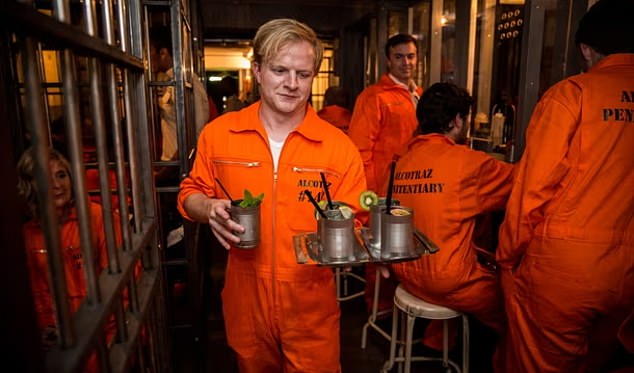A new bar has sparked outrage before it even opened for asking customers and staff to dress like prisoners.
Alcotraz, which is a play on the famous American prison Alcatraz, will open in Melbourne in June and promises an “immersive cocktail experience like no other”.
Customers must “smuggle” their own alcohol to staff, who dress up as “corrupt guards,” so that bartenders posing as inmates can mix up a cocktail.
Visitors are also given orange jumpsuits to wear while they sip their cocktails behind bars in mock prison cells.
Marketing firm Fever, which is partnered with British company Inventive Productions, explained that the bar concept represented the “Hollywood-style narrative” of prisons.
A new bar called Alcotraz, set to open in Melbourne in June, has faced criticism for its immersive prison experience concept (pictured).

Patrons must dress in orange prison-like jumpsuits and “smuggle” their own alcohol into the bar alongside staff posing as “corrupt guards.”
In a joint statement, the companies said the bar was a “subtle” reference to cult American films and television such as Shawshank Redemption and Orange is the New Black.
“The Alcotraz theatrical experience focuses on providing guests with the unique opportunity to immerse themselves in a fictional, Hollywood-like narrative that is in no way based on the real-life hardships and harsh realities of prison systems. current,” it reads.
Alcotraz faced fierce backlash for fetishizing “misfortune” after opening several locations in the UK, and has received similar criticism in Australia.
The Australian charity National Network of Incarcerated and Formerly Incarcerated Women and Girls issued a statement Tuesday calling Alcotraz “disturbingly insensitive” for trivializing the harsh realities of prison.
The charity also called on the public to boycott Alcotraz and reject “any establishment that seeks to profit from the exploitation” of oppression.
National Network member and activist Tabitha Lean said the bar was a “slap in the face” to people who had been traumatized and brutalized by the prison system.
“Prisons are places of immense pain and suffering, especially for Aboriginal people who face higher rates of incarceration and deaths in custody,” he said.
“Making this a bar topic is a slap in the face to those who have experienced real trauma and brutality.”
Ms Lean added the callousness of the bar’s concept was magnified by opening its doors on stolen Aboriginal land.
‘Alcotraz needs to read the room. They are building their business on land they own. communities that are being devastated by prisons,” said Ms. Lean.
‘The very notion of a prison-themed bar on land with “a history of continued dispossession and oppression of Aboriginal communities is abhorrent.”


Tabitha Lean (left), an advocate with the National Network of Incarcerated and Formerly Incarcerated Women and Girls, called on the public to boycott the bar. Sisters Inside executive director and National Network member Debbie Kilroy (R) said the bar turned incarceration into a form of entertainment for “privileged white people.”
Sisters Inside executive director and National Network member Debbie Kilroy said the ban was to turn incarceration into a form of entertainment.
“Alcotraz’s attempt to turn imprisonment into a form of entertainment is a gross minimization of the suffering endured by people who have been criminalised,” Ms Kilroy said.
“Creating a space where people can pay to pretend they are prisoners is not only reductionist but also incredibly disrespectful.”
Ms Kilroy criticized the concept as “grotesque” as it allowed “privileged white people” to pretend to be prisoners while others continue to suffer behind bars.
‘Alcotraz is not just bad taste; “It shows a fundamental disregard for the lived experiences of people who have been and continue to be harmed by the prison system,” Ms Kilroy said.
‘Prison is not a game: it is harsh, brutal and, all too often, a life-ending reality. Privileged white people dressing up as prisoners for fun while real people suffer is just grotesque.”

Alcotraz, which is a play about the notoriously brutal Alcatraz prison in the United States, is the brainchild of marketing firm Fever and British company Inventive Productions.

Inventive Productions and Fever explained that the bar concept represented the “Hollywood-style narrative” of prisons and was a “subtle” representation of American television and cult films, including Orange is the New Black and Shawshank Redemption.
A spokesperson for Fever and Inventive Productions explained that they also have a partnership with Innocence Project London.
Innocence Project London is a charity that works to prevent miscarriages of justice and investigates cases of convicted people who have maintained their innocence but have exhausted the criminal appeal process.
“The association demonstrates its commitment to educating and enriching its customers and communities on topics relevant to their immersive experiences,” the spokesperson said. The Guardian.
“Inventive Productions remains sensitive to the real-world difficulties that could be associated with these types of stories and evaluates how best to support those around us.”
The number of Australian prisoners increased by three per cent in the 12 months from mid-2022 to mid-2023.


